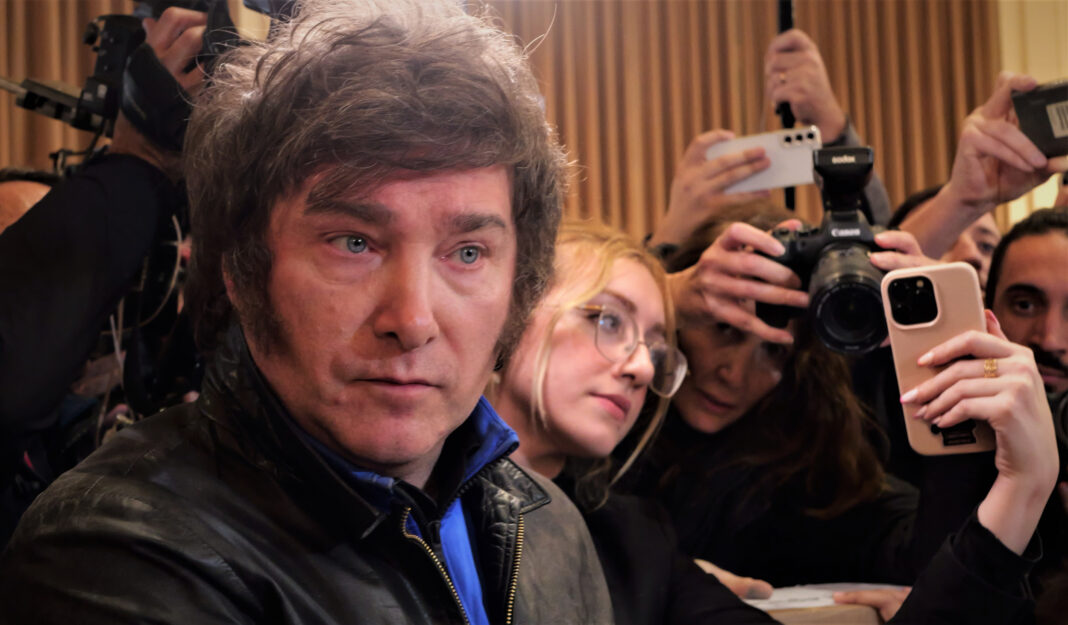by Maurizio Sacchi
Javier Milei, an ultra-liberal economist, leads the primaries with 30% of the polls, followed by the Peronist Sergio Massa (21%) and the conservative Patricia Bullrich (almost 17%). The sum of the votes between Bullrich and another candidate from the traditional right-wing Together for Change list, Horacio Rodríguez Larreta, is 28.3%, more than two points behind Milei. The Peronist Front, with its worst primary result since 2011, is in third place with 27.2%.
Milei, a self-described “anarcho-capitalist’”, opposes abortion, believes climate change is a “trick” invented by the left, advocates the end of the State and identifies with Spain’s far-right Vox party. The primaries painted a three-party scenario, a novelty in a country dominated for years by two main coalitions: one led by the Peronists and the other by the right, created by former President Mauricio Macri. Promising an end to the political elite, Milei turned Argentina’s political landscape upside down.
To win in the first round of the general election on 22 October, Milei and his party, Libertad Avanza, must win 45% of the vote, or 40% with a 10-point difference to the runner-up. “This is a historic moment for all of us, unimaginable,” said Milei’s running mate, Victoria Villarruel, who is known for publicly praising Argentina’s last dictatorship.
Milei wants to ban abortion, legalised in 2020. He also supports the right to bear arms and considers the sale of organs to be ‘a market like any other’. He is also in favour of closing down the Ministry of Education and the Ministry of Social Development, as well as agreeing to ‘burn down’ the Central Bank as a prelude to dollarising the economy to end inflation.
The economy is certainly the hot topic when it comes to Argentina’s situation. But on the idea of an official ‘dollarisation’ of the southern Country, the director of the International Monetary Fund’s Institute of the Americas, Alejandro Werner, said that the IMF considers Javier Milei to be a ‘very uncertain option’ and that it ‘does not like’ his proposal to dollarise the Argentine economy. On the other hand, he considers it ‘very likely’ that the IMF’s review of the Country will be approved and said that “whatever the IMF disburses between now and when the next Government takes office will allow Argentina to avoid any kind of default”.
The privatisation of education, Milei’s banner, was the subject of the first protests. The Superior Council of the National University of Cordoba declared itself in favour of “the non-delegable nature of the State’s role in public and free education (…) because it is the defence of educational justice, scientific sovereignty and democracy” and rejected Javier Milei’s proposal to close down or privatise the National Council for Scientific and Technical Research.
The disillusionment of those who voted for Fernández four years ago explains this result. Voters were confident that he would lead the country out of the economic crisis after the Government of Macri, who left power in 2019 with 50% inflation. But since then, the economic situation has only worsened, reaching 115.6% annually. Peronist voters blame the President for a weak stance towards international creditors and for failing to reduce poverty rates despite an improvement in employment. But Peronist presidential candidate Sergio Massa remains optimistic. “This is the end of the first half of the year. We still have the second half. We will fight until the end”.
The great hope of Peronism is now in the hands of the Kirchnerist Governor of Buenos Aires Province, Axel Kicillof, who is running for re-election. He won 36.4% of the vote in the country’s largest province.
Meanwhile, President Alberto Fernández assured that the Government had “listened to what the ballot box said” and that a series of measures would be taken to alleviate the situation of low-income families. To this end, on 22 August he inaugurated 319 social housing units, bringing the total to 125,000 over the past four years. Fernández called for ‘democratic coexistence’ following the attacks on supermarkets after the vote: “We have seen organised events. I ask everyone to pay attention to tranquillity and social peace,” he said, presiding over a ceremony in Neuquén.
The team of priests from the poor and popular neighbourhoods of Buenos Aires and the Greater Buenos Aires area has called for a mass “to atone for the offenses” against the Pope during the electoral campaign, especially by the candidate of La Libertad Avanza, Javier Milei. The celebration will take place on Tuesday, 5 September, to “vindicate Pope Francis and repudiate all the offences, lies and insults (…) expressed in this electoral campaign”.
On the cover photo, primaries runner-up Javier Milei © Facundo Florit/Shutterstock.com
























